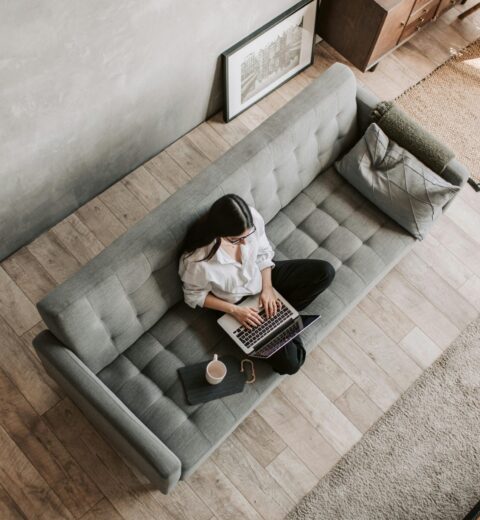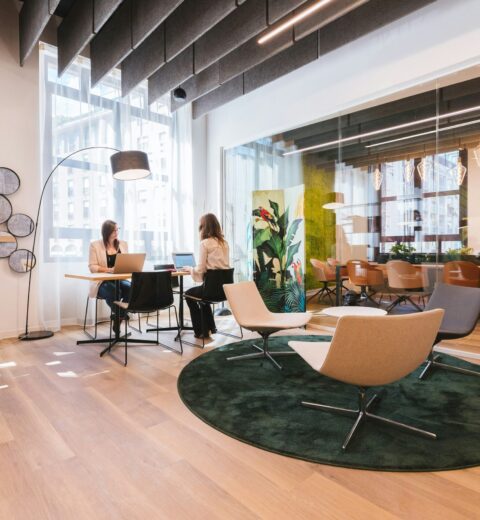How to design a startup office space without breaking the bank
You’ve done the paperwork, invested the capital, bought all the supplies and found your perfect office space. Now what? Well, unless you want to sit on the floor with your laptops, you’ll probably need to invest in some decor. But having spent all of that time and money setting up, you may not have much left over to create your dream startup office space.
Thankfully, the low-fi approach that characterises most startups is perfect for decorating. Instead of dreary, uniform office furniture and motivational posters, embrace the second-hand, kitsch and quirky. By harnessing the personality, drive and creativity of your workforce, you can easily and economically build an environment that people enjoy being in, and will inspire you to grow and improve.
Use personal effects
Whatever Einstein might think, a cluttered desk really does impinge on productivity. However, this doesn’t mean your desks should be empty. While you could invest in some generic clutter, it’s a much better idea to invite employees to bring their own personal effects in. This saves you from having to spend any money at all, and gives them some control over the decorating process.

Framed photos and artwork, desk ornaments, or even toys and figures can help to personalise the office without making it feel too busy. This will make each workstation distinct to its occupant, giving the workplace a homely vibe, and giving any visitors or new employees a visual primer on each person. While this isn’t great for creating a unified aesthetic, you can instead look to create themed areas, perhaps using picture frames with certain colours, and investing in accent lighting or other colour-coordinated elements later on.
Embrace nature
Greenery is the holy grail of any office space, yet it remains decidedly underused, often amounting to a lonely and under-watered fern on top of a filing cabinet. Decorating your startup office space with a variety of indoor plants is a brilliant way to create an appealing environment without breaking the bank, and has numerous other benefits.

As well as being cheap to buy, plants are proven to positively impact productivity and general health. Plants obviously remove carbon dioxide and add oxygen to the atmosphere, potentially improving concentration and reducing fatigue. But they can also suck volatile chemicals and particulates out of the air, improving air quality and reducing the incidence of various illnesses. This is particularly valuable if your new startup space is near busy roads or in a smog-choked area.
A clean air study by NASA established the ten best indoor plants for improving air quality, with ferns ranking particularly highly. While they recommend a minimum of one plant per 100 square metres of office space, it doesn’t hurt to have more. Using tall potted plants such as Happy Plants or Umbrella Plants, hanging ferns on shelves, or even a climbing plant on an indoor trellis will help to segment areas, and inject colour into the workplace. They’ll also make everyone that bit happier, as greenery is scientifically proven to help with our mental health.
Get creative with DIY
There’s obviously nothing cheaper than making things yourself. You might not think of yourself as the most practical person, but you’d be surprised at what you’re capable of, and how simple some DIY can be. As an example, look at the ever-economical Amazon, where old wooden doors were bolted to frames and used as improvised desks.

A trip to the local recycling centre or scrapyard might yield some components that you can do something interesting with. Think about your industry and niche, and see if you can come up with something that reflects on your business and interests. A digital or computer company could recycle stacks of discs into table legs, or hollow out an old CRT monitor and use it as a display cabinet. A fashion business could recycle fabrics and use them to wrap plain picture frames, or weave them into a window or door curtain. You could crowdsource ideas and old junk from your employees, or even dedicate a day to DIY, using it as a team-building exercise.
Bring your own entertainment
No startup is quite complete without a rec room. Yet pool tables, table football and indoor putting greens are a hefty investment, and smack a little of trying to run before you can walk. Downtime is important, and having an area to relax or take lunch is great if you have the space for it. But there are a few more economical ways to offer this respite in your workplace that most employees will be amenable to.
A decent-sized 1080p TV can be found for £100 or less online, and is not a bad investment, but you’ll want something to display on it. One solution is simply to plug in one of your laptops, or buy a Chromecast to stream content to it. But instead, you might consider asking employees what they can contribute. It might be that one of them has a games console or DVD player that they are happy to loan to the office. In the former case, it might even be an opportunity for team building. Just don’t play Mario Kart, or you might need to open an HR department too.
Choose substance over style
If you’re a startup in the digital space, you likely have a set of preconceptions about what your workplace should look like. iMacs, ball pits, big TVs and glass walls all likely come to mind, with your employees careening about on electric scooters. But bear in mind that all of these things are designed for two reasons: to make you look good, or to alleviate issues inherent to a corporate work culture.

Looking good is great, of course, but it’s not always the most important thing. If you’re thinking of buying iMacs, for instance, consider just buying PCs instead. If you’re worried about optics, there are a range of attractive PC cases and other features which will make them look more sleek. PCs are more customisable, cheaper and easier to repair than Macs, and may be a worthy compromise if you aren’t wedded to Mac OS X.
It’s ok to aspire to the level of success of other companies in your field, but don’t try to copy them. They didn’t become successful because they had exciting, fun office spaces; they started out in the same bedrooms and industrial estates as any small business, and applied those aesthetics later. Start out on your own path, and only buy the things you really need. The time for extravagance is when you have the income to support it.
Photo Credits: eOffice
—
Former journalist Katya Puyraud is the co-owner of Euro Start Entreprises, specialising in company formation in France and the rest of the EU. Since 2007 Euro Start Entreprises has helped budding digital nomads, entrepreneurs and expanding SMEs to open their companies in over 30 countries worldwide. You can find her on Twitter @ESEntreprises



